30 Different types of Jasmine plants, There are over 30 distinct types of jasmine, each adding its own beauty and fragrance to gardens worldwide. Some are known for their star-shaped, highly fragrant blooms, while others are appreciated for their lush, green foliage. Depending on the variety, jasmine can grow as shrubs, vines, or ground covers, offering versatility in garden design. They thrive in a range of climates, with some being evergreen and others deciduous. While most jasmine plants are known for their sweet scent, a few are non-fragrant but still produce striking flowers in shades of white, yellow, or pink.
These plants often attract pollinators like bees and butterflies, making them a favorite in wildlife gardens. Jasmine is also used in perfumes, teas, and traditional medicines. Whether you’re looking to enhance your landscape or add a touch of elegance indoors, there’s likely a type of jasmine perfect for the task. India is home to a wide types of jasmine plant in india, each with its unique beauty, fragrance, and cultural significance. Here is a list of 30 different types of Jasmine plants found in India, along with a brief description of each:
30 Different types of Jasmine plants Short Intro
| Jasmine Plant Scientific Name | Common Name |
| Jasminum sambac | Arabian Jasmine |
| Jasminum grandiflorum | Spanish Jasmine |
| Jasminum auriculatum | Jasmine of the East |
| Jasminum multiflorum | Winter Jasmine |
| Jasminum sambac ‘Belle of India’ | Belle of India Jasmine |
| Jasminum sambac ‘Maid of Orleans’ | Maid of Orleans Jasmine |
| Jasminum flexile | Flexible Jasmine |
| .Jasminum angustifolium | Narrow-leaf Jasmine |
| Jasminum mesnyi | Primrose Jasmine |
| Jasminum officinale | Common Jasmine |
| Jasminum nitidum | Glabrous Jasmine |
| Jasminum rex | King Jasmine |
| Jasminum dichotomum | Forked Jasmine |
| Jasminum humile | Italian Jasmine |
| Jasminum beesianum | Beese Jasmine |
| Jasminum polyanthum | Pink Jasmine |
| Jasminum malabaricum | Malabar Jasmine |
| Jasminum lanceolarium | Lance-leaf Jasmine |
| Jasminum calophyllum | Calophyllum Jasmine |
| Jasminum elongatum | Elongated Jasmine |
| Jasminum nervosum | Nerve-leaf Jasmine |
| Jasminum parkeri | Parker’s Jasmine |
| Jasminum sambac ‘Grand Duke of Tuscany’ | Grand Duke of Tuscany Jasmine |
| Jasminum wallichianum | Wallich’s Jasmine |
| Jasminum azoricum | Azorean Jasmine |
| Jasminum dispermum | Two-seed Jasmine |
| Jasminum simplicifolium | Simple-leaved Jasmine |
| Jasminum fruticans | Shrubby Jasmine |
| Jasminum stenolobum | Narrow-lobed Jasmine |
| Jasminum azoricum | Azorean Jasmine |
1. Jasminum sambac (Mogra/Arabian Jasmine)
- Fragrant, white, star-shaped flowers.
- Commonly used in garlands and perfumes.
- Jasminum sambac health benefits, Jasmine tea may help reduce fat cells and maintain weight.
- National flower of the Philippines and Indonesia. Click here to buy Mogra plant online.
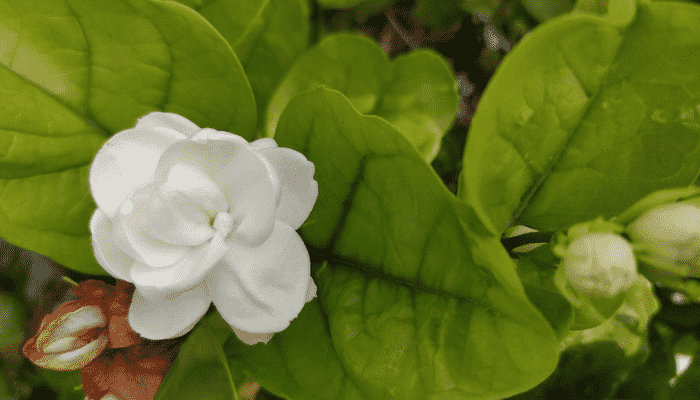
2. Jasminum grandiflorum (Spanish Jasmine)
- Large, white flowers with a strong fragrance.
- Often used in traditional medicine and perfumery.
- Known for its therapeutic properties.
- Jasminum grandiflorum common name is Spanish jasmine.
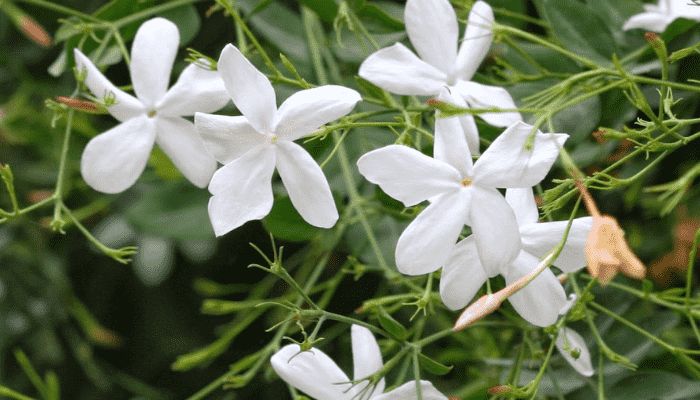
3. Jasminum auriculatum (Juhi/Jasmine Auriculatum)
- Small, star-shaped white flowers.
- Commonly grown as an ornamental plant.
- Used in religious offerings. Jasminum Auriculatum plant purchase by clicking here.
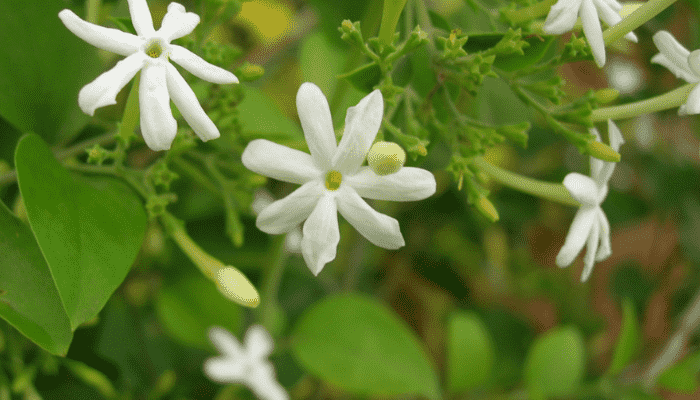
4. Jasminum multiflorum (Indian Jasmine/Downy Jasmine)
- Numerous white flowers blooming in clusters.
- Thrives in warm climates.
- Decorative plant often used in landscaping. Downy Jasmine plant purchase by clicking here.
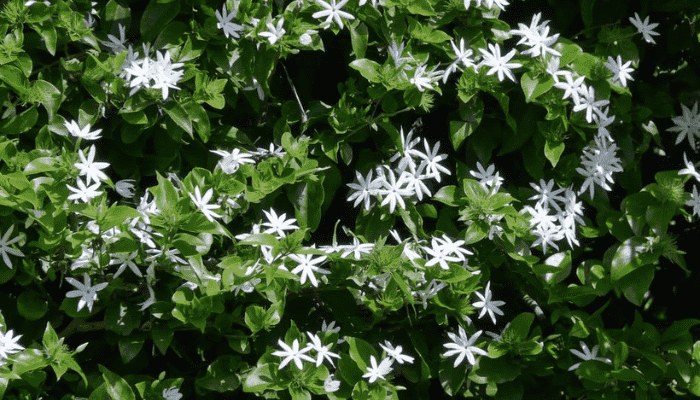
5. Jasminum sambac ‘Belle of India’
- Elongated, white flowers with a sweet fragrance.
- Popular in home gardens.
- Used in garlands and rituals.
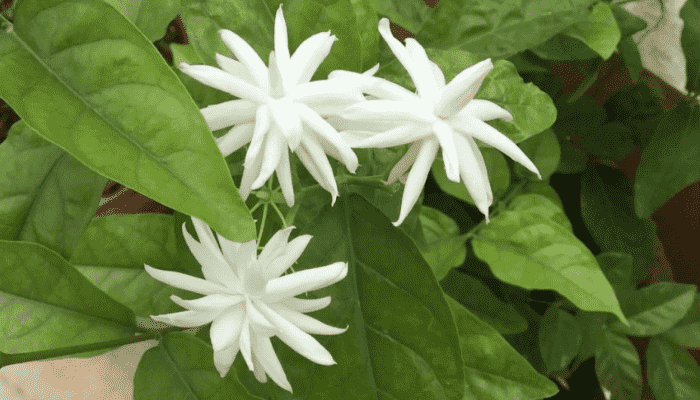
6. Jasminum sambac ‘Maid of Orleans’
- Single-layered, white blooms.
- Strongly fragrant.
- Suitable for pots and hanging baskets.
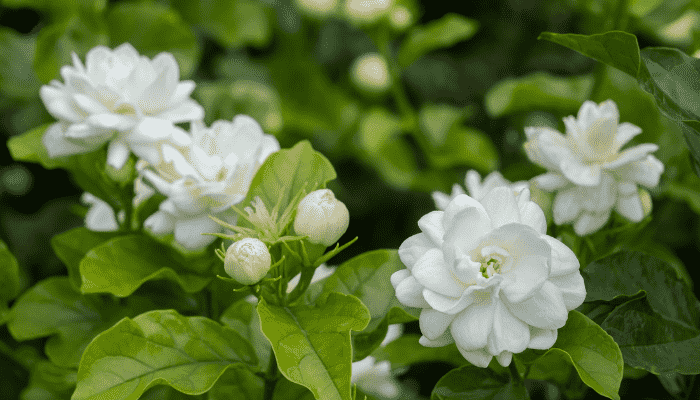
7. Jasminum flexile (Yellow Jasmine)
- Yellow, fragrant flowers.
- Vine-like growth habit.
- Ideal for pergolas and trellises.
- Yellow jasmine scientific name is Gelsemium sempervirens
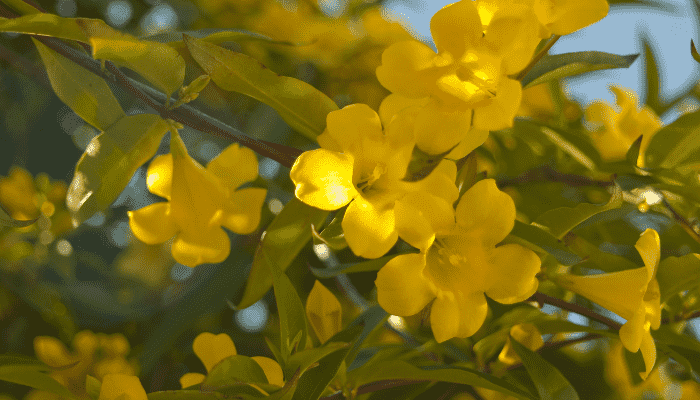
8. Jasminum angustifolium (Wild Jasmine)
- Small, white, fragrant flowers.
- Native to the Indian subcontinent.
- Prefers wild, natural settings.
- Jasminum angustifolium common name is Banmallika.
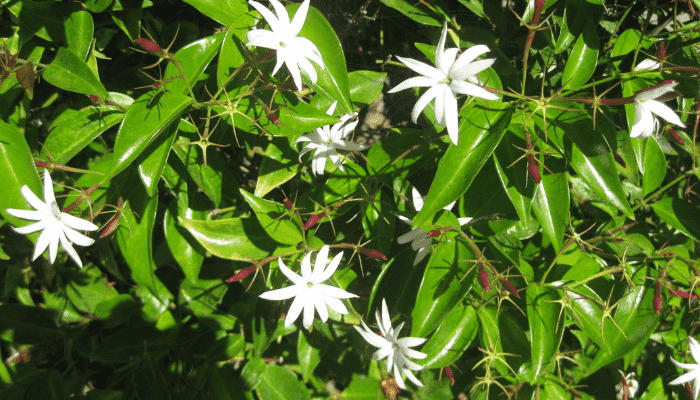
9. Jasminum mesnyi (Primrose Jasmine)
- Yellow, semi-double flowers.
- Evergreen shrub.
- Blooms in winter and early spring.
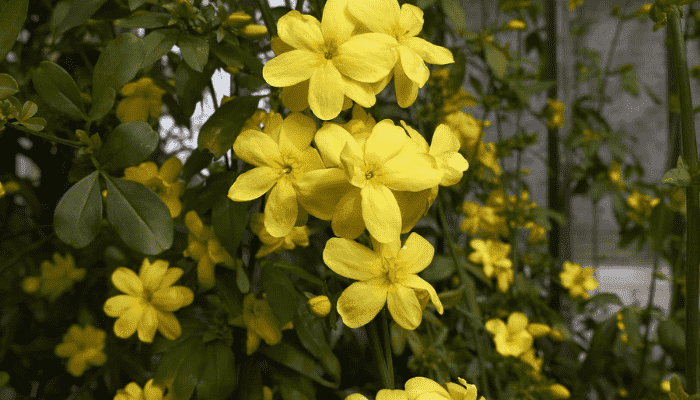
10. Jasminum officinale (Common Jasmine)
- White, strongly fragrant flowers.
- Used in aromatherapy and perfumery.
- Blooms in summer and fall.
- Jasminum officinale common name is common jasmine, simply jasmine.
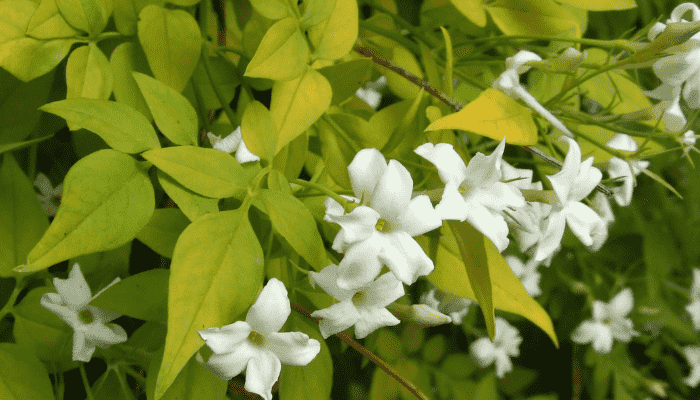
11. Jasminum nitidum (Shining Jasmine)
- Star-shaped, white flowers with a purple tinge.
- Glossy leaves and fragrant blooms.
- Suitable for hedges and borders.
- Jasminum nitidum common name is Angel Wing Jasmine, Confederate Jasmine, Royal Jasmine, Windmill Jasmine, Shining Jasmine, Star Jasmine, Downy jasmine, Kunda, and Ban malati.
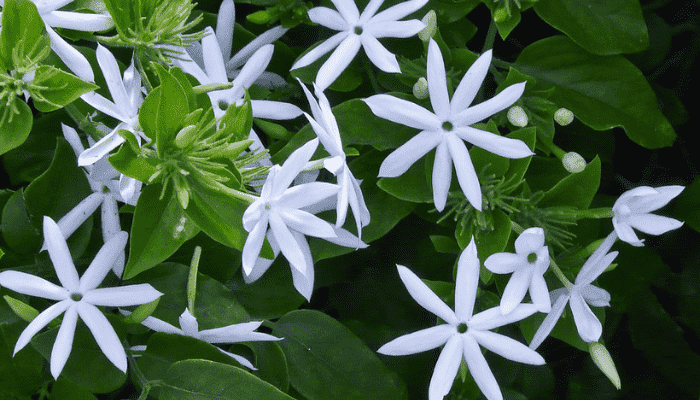
12. Jasminum rex (King Jasmine)
- Large, white flowers with a mild fragrance.
- Grows as a climbing vine.
- Prefers warm climates.
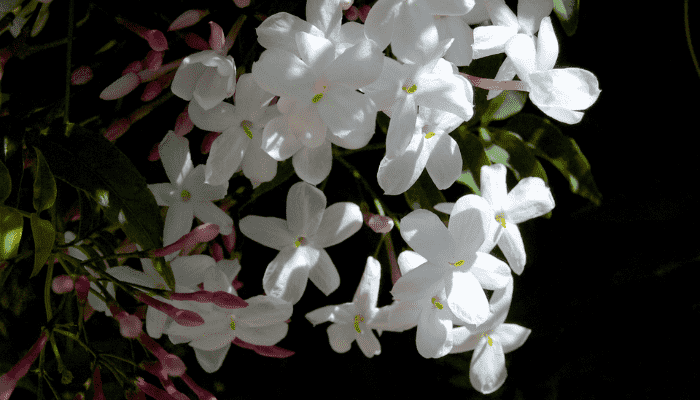
13. Jasminum dichotomum (Gold Coast Jasmine)
- Small, pink buds opening to white flowers.
- Known for its contrast of colors.
- Thrives in tropical environments.
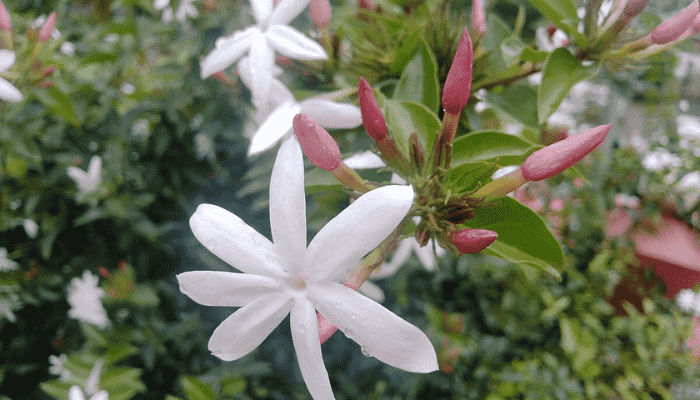
14. Jasminum humile (Italian Jasmine)
- Yellow flowers, mildly fragrant.
- Grows as a shrub or vine.
- Popular in gardens and landscaping.
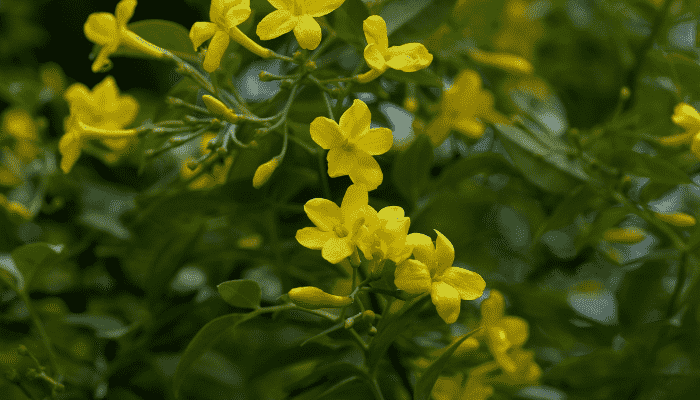
15. Jasminum beesianum (Beesianum Jasmine)
- Pink or red flowers.
- Delicate fragrance.
- Grows well in partial shade.
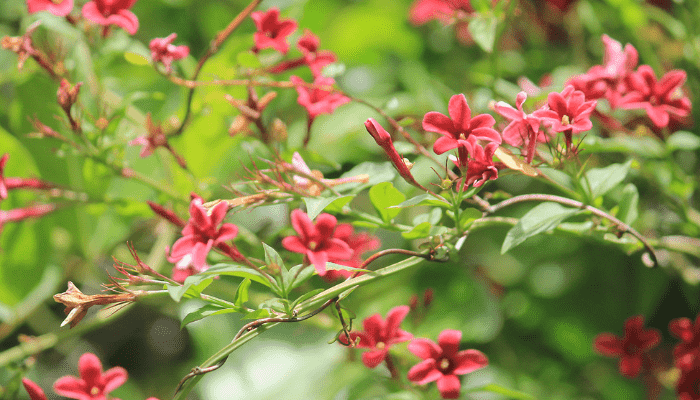
16. Jasminum polyanthum (Pink Jasmine)
- White flowers with pinkish buds.
- Strongly fragrant.
- Pink Jasmine benefits, Its captivating, fragrant flowers infuse the air with a delightful aroma, drawing in pollinators like bees and butterflies. Many believe that the unique scent of Pink Jasmine can evoke profound spiritual pleasure and effectively alleviate stress.
- Ideal for pergolas and garden walls.
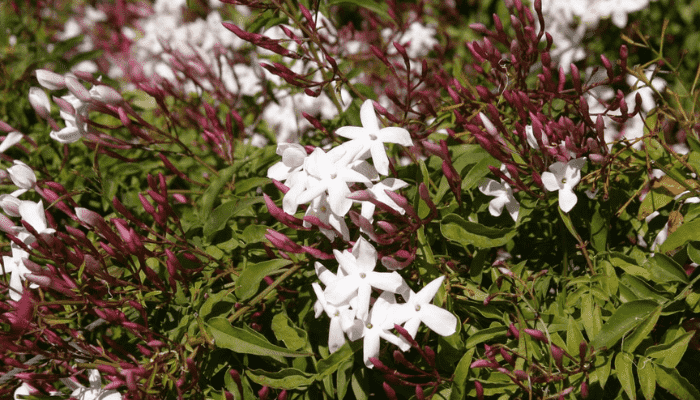
17. Jasminum malabaricum (Malabar Jasmine)
- White flowers with a pleasant fragrance.
- Native to the Western Ghats of India.
- Used in traditional medicine.
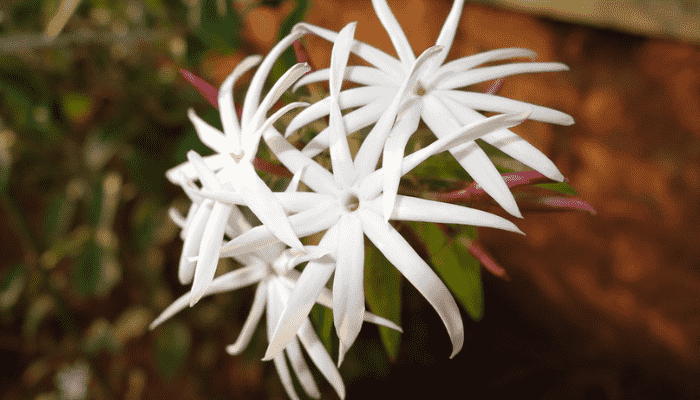
18. Jasminum lanceolarium (Lance-Leaved Jasmine)
- White, fragrant flowers.
- Grows as a large shrub or small tree.
- Prefers moist, shaded areas.
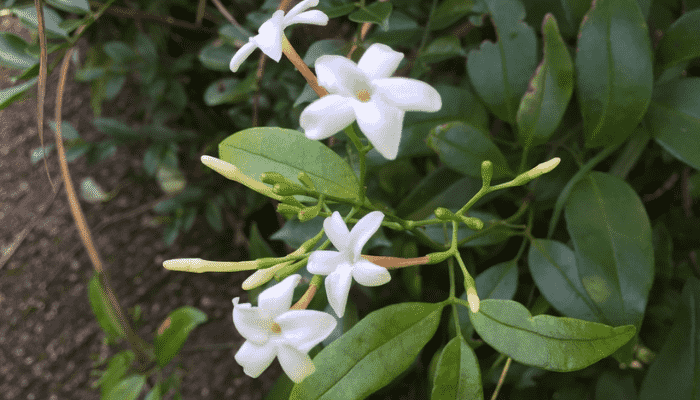
19. Jasminum calophyllum (Wild Forest Jasmine)
- Small, white, fragrant flowers.
- Native to forested regions.
- Suitable for naturalistic gardens.
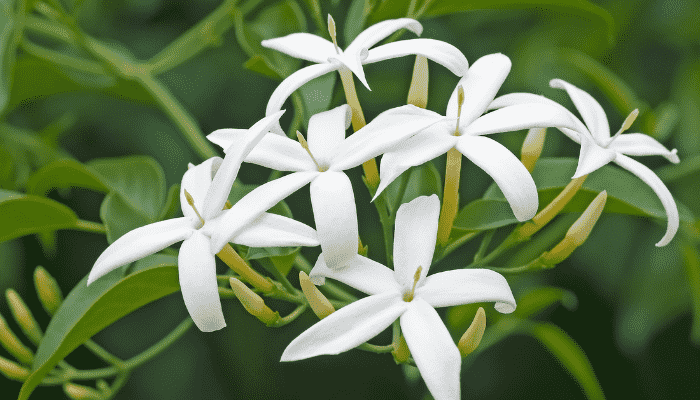
20. Jasminum elongatum (Vietnamese Jasmine)
- Small, white flowers with elongated petals.
- Fragrant and ornamental.
- Often found in tropical regions.
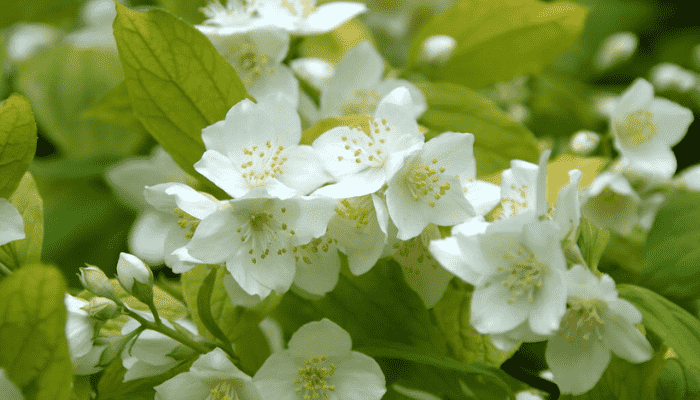
21. Jasminum nervosum (Redbud Jasmine)
- Red buds opening to white, fragrant flowers.
- Climbing vine.
- Suitable for fences and trellises.
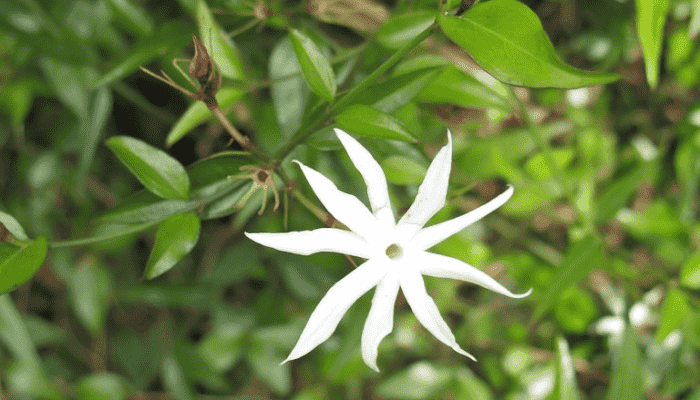
22. Jasminum parkeri (Dwarf Jasmine)
- Yellow flowers.
- Compact, bushy growth.
- Dwarf Jasmine tree care, Ensure optimal moisture by letting the top half-inch of soil dry out between waterings. Cut back on watering during the fall and winter months when plants are dormant.
- Suitable for rock gardens and small spaces.
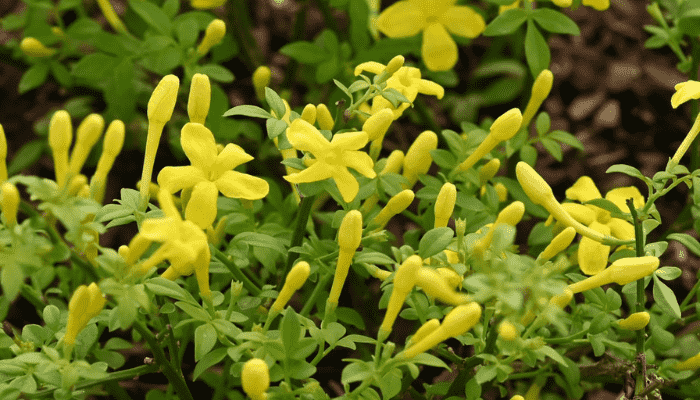
23. Jasminum sambac ‘Grand Duke of Tuscany’
- Double-layered, white blooms.
- Strong fragrance.
- Popular for religious offerings and garlands.
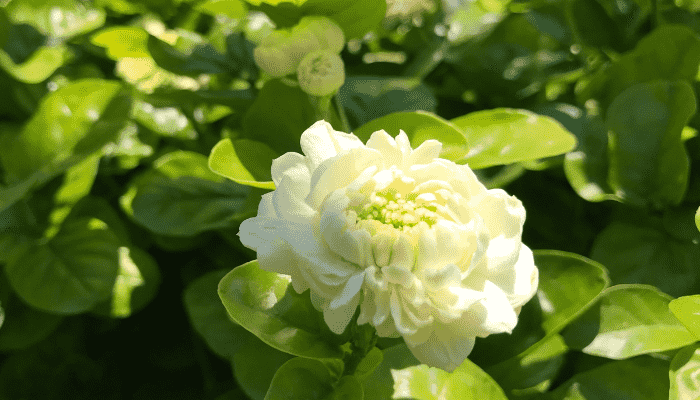
24. Jasminum wallichianum (Himalayan Jasmine)
- White, fragrant flowers.
- Native to the Himalayas.
- Himalayan Jasmine care, Boost jasmine growth in the spring when buds begin to swell, then energize it monthly throughout the growing season.
- Hardy plant that tolerates cooler climates.
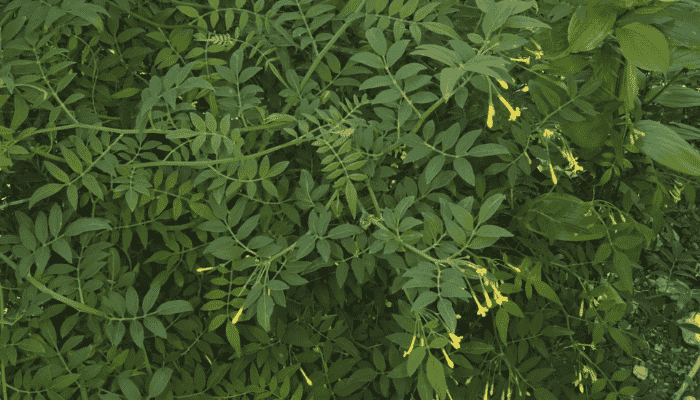
25. Jasminum azoricum (Azores Jasmine)
- White flowers with a star-like shape.
- Mild fragrance.
- Grows as a climbing vine.
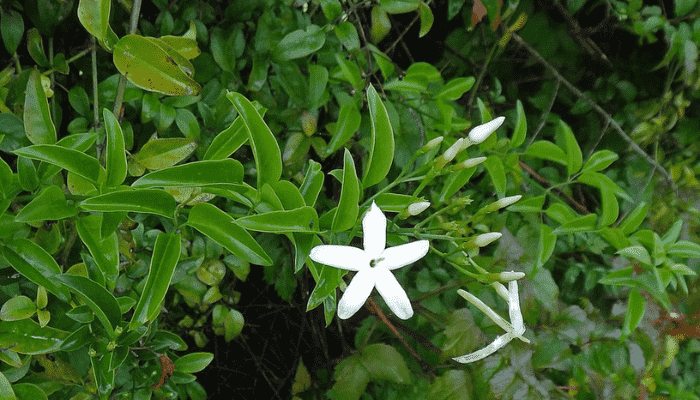
26. Jasminum dispermum (Two-Seeded Jasmine)
- Small, white flowers.
- Found in forested regions.
- Grows well in shaded areas.
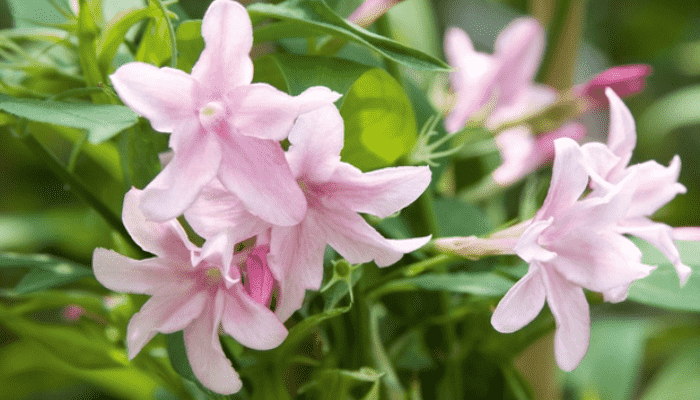
27. Jasminum simplicifolium (Australian Jasmine)
- White, fragrant flowers.
- Glossy green leaves.
- Suitable for warm, tropical climates.
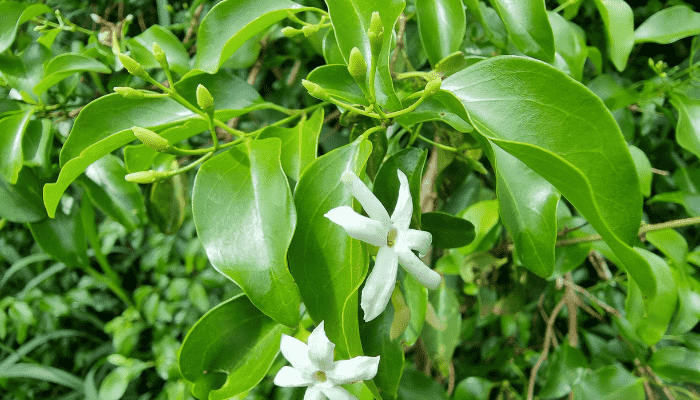
28. Jasminum fruticans (Wild Jasmine Shrub)
- Yellow flowers with a mild fragrance.
- Grows as a dense shrub.
- Ideal for borders and hedging.
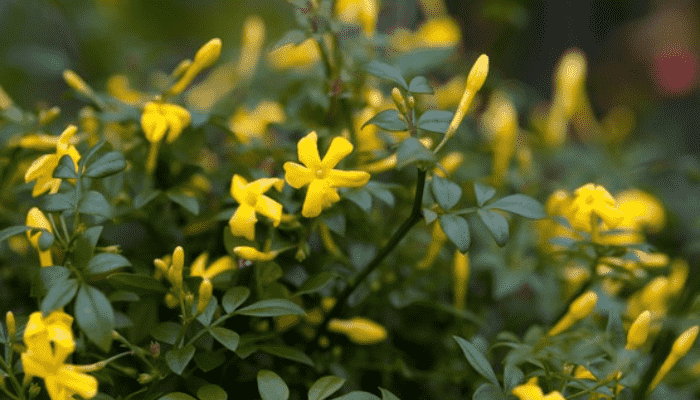
29. Jasminum stenolobum (Narrow-Lobed Jasmine)
- Small, white, fragrant flowers.
- Grows as a vine.
- Prefers sunny locations.
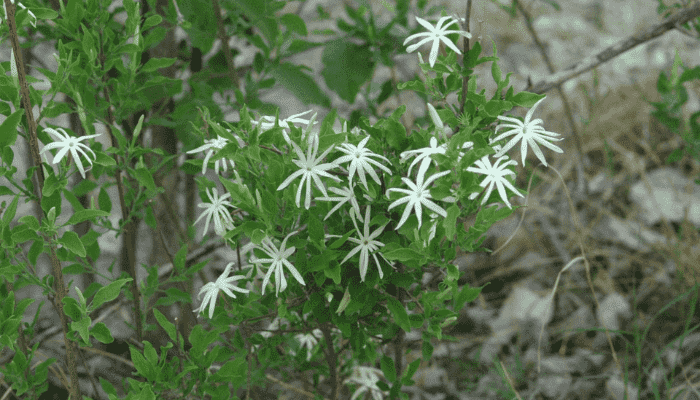
30. Jasminum azoricum (Madeira Jasmine)
- White flowers with a mild fragrance.
- Grows as a climbing plant.
- Ideal for tropical and subtropical climates.
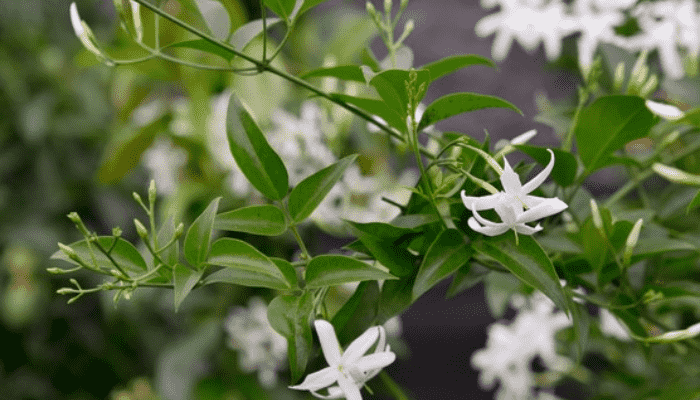
Each of these Jasmine varieties contributes to the rich tapestry of flora in India, with their diverse colors, fragrances, and forms making them popular for gardens, religious ceremonies, and the perfume industry. Jasmine plants often symbolize purity, love, and beauty in Indian culture and are cherished for their ornamental and aromatic qualities.
FAQs
Why do girls like jasmine flowers?
In addition to its captivating fragrance, women in South India adorn themselves with Jasmine flowers, as they are believed to bring immense joy and prosperity to the household, filling the air with an aura of positive energy and blessings.
How many varieties of jasmine are there?
Jasmine (Jasminum; /ˈjæsmɪnəm/ YAS-mih-nəm) is a captivating genus of vibrant shrubs and climbing vines belonging to the olive family, Oleaceae. Boasting around 200 enchanting species, jasmine thrives in the lush, tropical, and warm temperate regions of Eurasia, Africa, and Oceania, making it a botanical marvel celebrated worldwide.
Which city in India is called city of jasmine?
Madurai, renowned as India’s “Jasmine City,” has long been the epicenter of the exquisite, fragrant “malligai” flower. For centuries, this enchanting bloom has flourished in the heart of the temple city, captivating all with its sweet, intoxicating aroma.
Which state is famous for jasmine?
Among the three varieties of jasmine native to Karnataka, the Mysore Mallige (Jasminum grandiflorum L.), a member of the Oleaceae family, reigns supreme in popularity. Its unmatched fragrance and widespread cultural significance set it apart. The other two remarkable varieties, Hadagali Mallige (Jasminum azoricum Vahl) and Udupi Mallige (Jasminum sambac L.), also hold their own charm, adding to Karnataka’s rich botanical heritage.
What is the proper name of jasmine plant?
“True jasmines belong to the botanical genus Jasminum. However, numerous other popular plants are often referred to as jasmine, thanks to their strikingly fragrant, white blooms that resemble the enchanting allure of the true jasmine.”


